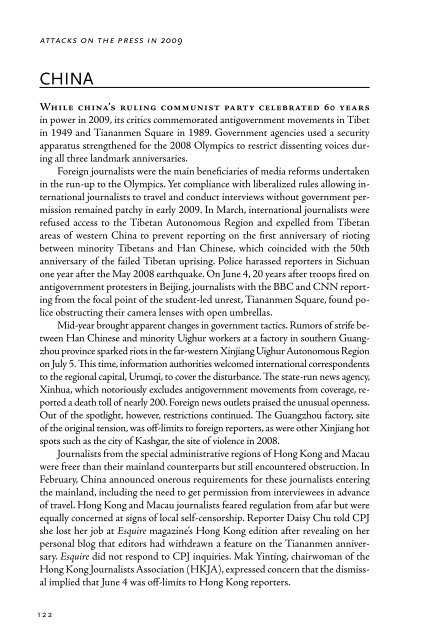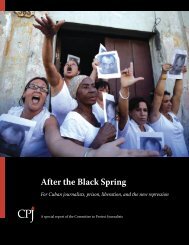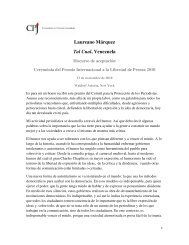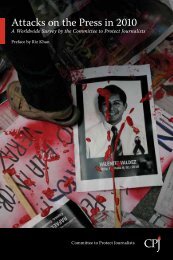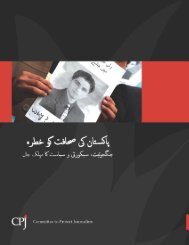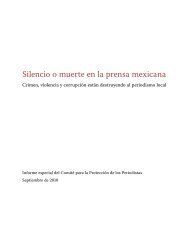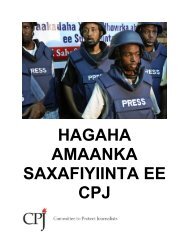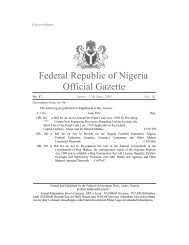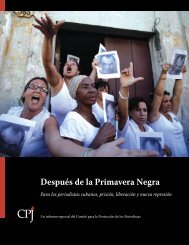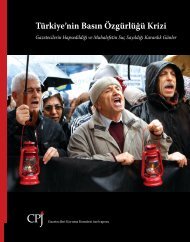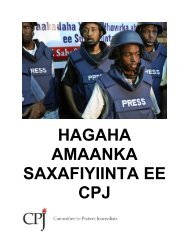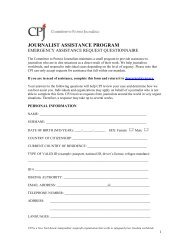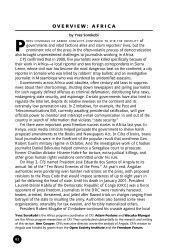Attacks on the Press - Committee to Protect Journalists
Attacks on the Press - Committee to Protect Journalists
Attacks on the Press - Committee to Protect Journalists
- No tags were found...
You also want an ePaper? Increase the reach of your titles
YUMPU automatically turns print PDFs into web optimized ePapers that Google loves.
attacks <strong>on</strong> <strong>the</strong> press in 2009asia: chinaCHINAWhile china’s ruling communist party celebrated 60 yearsin power in 2009, its critics commemorated antigovernment movements in Tibetin 1949 and Tiananmen Square in 1989. Government agencies used a securityapparatus streng<strong>the</strong>ned for <strong>the</strong> 2008 Olympics <strong>to</strong> restrict dissenting voices duringall three landmark anniversaries.Foreign journalists were <strong>the</strong> main beneficiaries of media reforms undertakenin <strong>the</strong> run-up <strong>to</strong> <strong>the</strong> Olympics. Yet compliance with liberalized rules allowing internati<strong>on</strong>aljournalists <strong>to</strong> travel and c<strong>on</strong>duct interviews without government permissi<strong>on</strong>remained patchy in early 2009. In March, internati<strong>on</strong>al journalists wererefused access <strong>to</strong> <strong>the</strong> Tibetan Aut<strong>on</strong>omous Regi<strong>on</strong> and expelled from Tibetanareas of western China <strong>to</strong> prevent reporting <strong>on</strong> <strong>the</strong> first anniversary of riotingbetween minority Tibetans and Han Chinese, which coincided with <strong>the</strong> 50thanniversary of <strong>the</strong> failed Tibetan uprising. Police harassed reporters in Sichuan<strong>on</strong>e year after <strong>the</strong> May 2008 earthquake. On June 4, 20 years after troops fired <strong>on</strong>antigovernment protesters in Beijing, journalists with <strong>the</strong> BBC and CNN reportingfrom <strong>the</strong> focal point of <strong>the</strong> student-led unrest, Tiananmen Square, found policeobstructing <strong>the</strong>ir camera lenses with open umbrellas.Mid-year brought apparent changes in government tactics. Rumors of strife betweenHan Chinese and minority Uighur workers at a fac<strong>to</strong>ry in sou<strong>the</strong>rn Guangzhouprovince sparked riots in <strong>the</strong> far-western Xinjiang Uighur Aut<strong>on</strong>omous Regi<strong>on</strong><strong>on</strong> July 5. This time, informati<strong>on</strong> authorities welcomed internati<strong>on</strong>al corresp<strong>on</strong>dents<strong>to</strong> <strong>the</strong> regi<strong>on</strong>al capital, Urumqi, <strong>to</strong> cover <strong>the</strong> disturbance. The state-run news agency,Xinhua, which no<strong>to</strong>riously excludes antigovernment movements from coverage, reporteda death <strong>to</strong>ll of nearly 200. Foreign news outlets praised <strong>the</strong> unusual openness.Out of <strong>the</strong> spotlight, however, restricti<strong>on</strong>s c<strong>on</strong>tinued. The Guangzhou fac<strong>to</strong>ry, siteof <strong>the</strong> original tensi<strong>on</strong>, was off-limits <strong>to</strong> foreign reporters, as were o<strong>the</strong>r Xinjiang hotspots such as <strong>the</strong> city of Kashgar, <strong>the</strong> site of violence in 2008.<strong>Journalists</strong> from <strong>the</strong> special administrative regi<strong>on</strong>s of H<strong>on</strong>g K<strong>on</strong>g and Macauwere freer than <strong>the</strong>ir mainland counterparts but still encountered obstructi<strong>on</strong>. InFebruary, China announced <strong>on</strong>erous requirements for <strong>the</strong>se journalists entering<strong>the</strong> mainland, including <strong>the</strong> need <strong>to</strong> get permissi<strong>on</strong> from interviewees in advanceof travel. H<strong>on</strong>g K<strong>on</strong>g and Macau journalists feared regulati<strong>on</strong> from afar but wereequally c<strong>on</strong>cerned at signs of local self-censorship. Reporter Daisy Chu <strong>to</strong>ld CPJshe lost her job at Esquire magazine’s H<strong>on</strong>g K<strong>on</strong>g editi<strong>on</strong> after revealing <strong>on</strong> herpers<strong>on</strong>al blog that edi<strong>to</strong>rs had withdrawn a feature <strong>on</strong> <strong>the</strong> Tiananmen anniversary.Esquire did not resp<strong>on</strong>d <strong>to</strong> CPJ inquiries. Mak Yinting, chairwoman of <strong>the</strong>H<strong>on</strong>g K<strong>on</strong>g <strong>Journalists</strong> Associati<strong>on</strong> (HKJA), expressed c<strong>on</strong>cern that <strong>the</strong> dismissalimplied that June 4 was off-limits <strong>to</strong> H<strong>on</strong>g K<strong>on</strong>g reporters.The HKJA asserted itself against <strong>the</strong> mainland in early September, leadingstreet protests after police roughed up and detained at least three H<strong>on</strong>g K<strong>on</strong>gjournalists <strong>on</strong> assignment in Urumqi. <strong>Press</strong> officials in Xinjiang defended <strong>the</strong> acti<strong>on</strong>,saying <strong>the</strong> journalists had been inciting unrest, according <strong>to</strong> HKJA. MainlandChinese journalists could not mount <strong>the</strong>ir own displays of protest withoutfear of reprisal, although local newspapers reported that <strong>the</strong>y were menacedand assaulted by police, security agents, and citizens in <strong>the</strong> course of <strong>the</strong>ir workthroughout <strong>the</strong> year. Guangzhou Ribao daily said three of its journalists were attacked<strong>on</strong> <strong>the</strong> job in separate episodes in August. One, reporter Liu Manyuan,was hospitalized after being assaulted by district security guards in D<strong>on</strong>gguanCity while investigating <strong>the</strong> death of a young woman, <strong>the</strong> paper said.Progress for foreign journalists was offset by tighter restricti<strong>on</strong>s <strong>on</strong> <strong>the</strong>ir interviewsubjects and Chinese assistants. In February 2009, <strong>the</strong> Ministry of ForeignAffairs-linked Beijing Pers<strong>on</strong>nel Service Corporati<strong>on</strong> for Diplomatic Missi<strong>on</strong>sissued a code of c<strong>on</strong>duct for Chinese aides of foreign news outlets. Alreadyforbidden by law from writing under <strong>the</strong>ir own bylines, Chinese assistants—whocan find legal employment with foreign news providers <strong>on</strong>ly through <strong>the</strong> pers<strong>on</strong>nelservice—faced dismissal or loss of accreditati<strong>on</strong> for c<strong>on</strong>ducting independentinterviews, <strong>the</strong> new code decreed.Foreign journalists investigating potentially critical s<strong>to</strong>ries <strong>to</strong>ld CPJ <strong>the</strong>y wereincreasingly anxious about repercussi<strong>on</strong>s for local colleagues and sources. SeveralTibetans and Uighurs who spoke openly about minority issues in <strong>the</strong>ir respectiveregi<strong>on</strong>s were detained in 2009, lending weight <strong>to</strong> those c<strong>on</strong>cerns. At least three Tibetanwriters were arrested between February and July. Overseas Tibetan rightsgroups reported in November that two had been separately tried and sentenced inclosed-door proceedings in Gansu province, both for revealing state secrets. KunchokTsephel Gopey Tsang, manager of <strong>the</strong> Tibetan cultural Web site Chomei, wasjailed for 15 years, while envir<strong>on</strong>mental activist and writer Kunga Tsayang wassentenced <strong>to</strong> five years in pris<strong>on</strong>.t o p developments»»More access for foreign reporters,tighter rules for local assistants.»»As <strong>on</strong>line use grows, governmentcensors sites, jails critics.24key statistic<strong>Journalists</strong> jailed as ofDecember 1, 2009.Tibetan rights organizati<strong>on</strong>s saidDokru Tsultrim, a m<strong>on</strong>k who wroteseveral articles in support of <strong>the</strong> DalaiLama, remained in cus<strong>to</strong>dy at <strong>the</strong>end of <strong>the</strong> year, but his locati<strong>on</strong> andlegal status were not known.Uighur Web site managers werealso targeted. Dilimulati Paerhati, aU.K.-based student, <strong>to</strong>ld AmnestyInternati<strong>on</strong>al that unidentified men<strong>to</strong>ok his bro<strong>the</strong>r, Dilixiati Paerhati,122123


